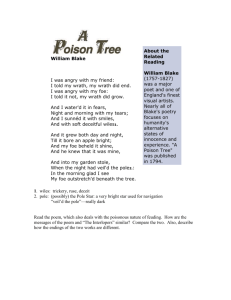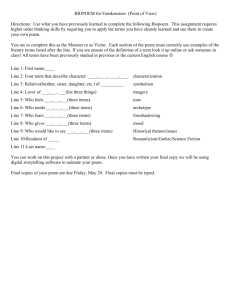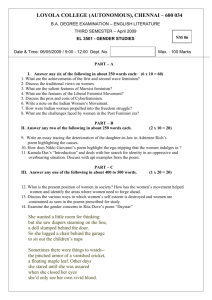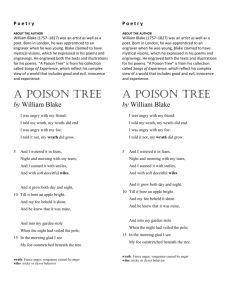are humans inherently good or evil
advertisement
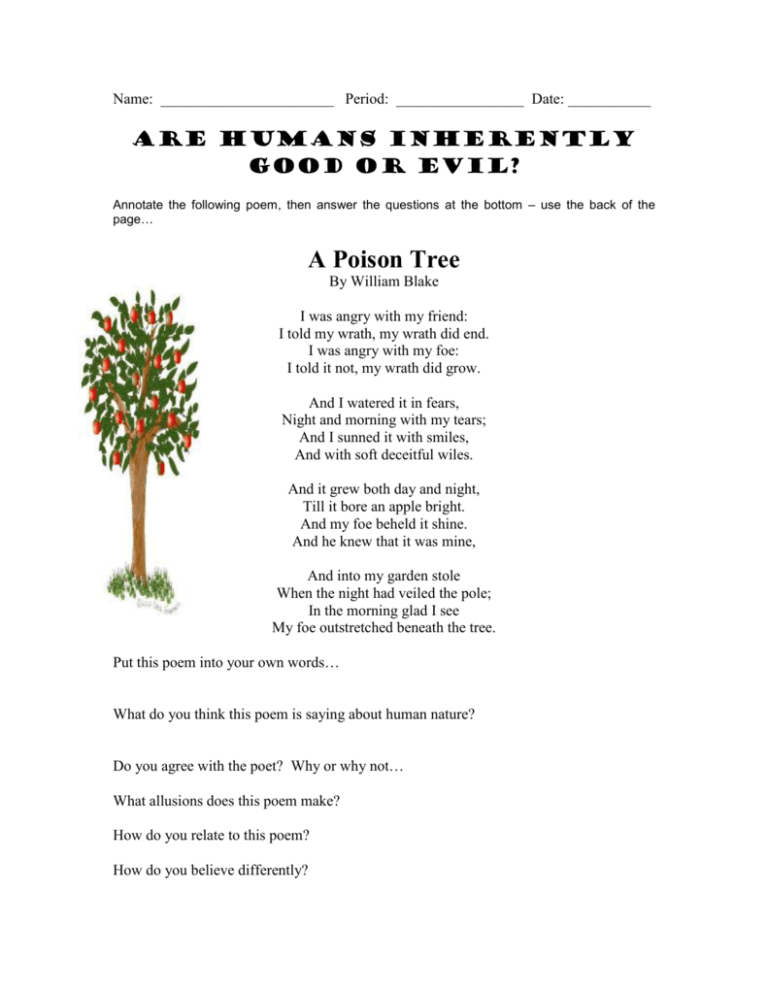
Name: _______________________ Period: _________________ Date: ___________ ARE HUMANS INHERENTLY GOOD OR EVIL? Annotate the following poem, then answer the questions at the bottom – use the back of the page… A Poison Tree By William Blake I was angry with my friend: I told my wrath, my wrath did end. I was angry with my foe: I told it not, my wrath did grow. And I watered it in fears, Night and morning with my tears; And I sunned it with smiles, And with soft deceitful wiles. And it grew both day and night, Till it bore an apple bright. And my foe beheld it shine. And he knew that it was mine, And into my garden stole When the night had veiled the pole; In the morning glad I see My foe outstretched beneath the tree. Put this poem into your own words… What do you think this poem is saying about human nature? Do you agree with the poet? Why or why not… What allusions does this poem make? How do you relate to this poem? How do you believe differently? Name: _______________________ Period: _________________ Date: ___________ ARE HUMANS INHERENTLY GOOD OR EVIL? Annotate the following poem, then answer the questions at the bottom – use the back of the page… A Poison Tree By William Blake I was angry with my friend: I told my wrath, my wrath did end. I was angry with my foe: I told it not, my wrath did grow. And I watered it in fears, Night and morning with my tears; And I sunned it with smiles, And with soft deceitful wiles. And it grew both day and night, Till it bore an apple bright. And my foe beheld it shine. And he knew that it was mine, And into my garden stole When the night had veiled the pole; In the morning glad I see My foe outstretched beneath the tree. Put this poem into your own words… What do you think this poem is saying about human nature? Do you agree with the poet? Why or why not… What allusions does this poem make? How do you relate to this poem? How do you believe differently? A Poison Tree - ANALYSIS In this poem and the two which follow it, a central metaphor explains a truth of human nature. A Poison Tree shares with The Human Abstract the image of a tree as it grows, while in London the image is of manacles (handcuffs): all of these Songs of Experience show the dark side of human nature. A Poison Tree tells how anger can be dispelled by goodwill or nurtured to become a deadly poison. It is appropriate that poems touching on Biblical themes should be parables. Blake does not tell us what is growing (although we may guess this to be the tree of the title) but it is evidently a plant of some kind: the real "fears" and "tears" are what metaphorically water the plant (encourage his hatred?), and "smiles" and "deceitful wiles" are as the sunshine which makes it grow: the reader at once grasps the simple natural metaphor, and the deep psychological truth it expresses. At length the tree grows to bear a single fruit, which the "foe" wants because he supposes the speaker to value it: "And he knew that it was mine". The sequel is shocking: the foe steals the apple and eats it, not knowing that it is poisonous: "In the morning glad I see/My foe outstretched beneath the tree". As we remember that this is a metaphor we realise that literal murder (of the body) is not what Blake describes but some profound spiritual, or (as we would now say) psychological harm is meant. This is a horrible poem because it depicts with appalling honesty the hatred of which man is capable and the cunning with which we can conceal our anger. The anger depicted here is not the anger we call the heat of the moment, but "wrath", one of the seven deadly sins, a brooding, festering desire to get even at all costs. The apple of the third stanza reminds us of the story of Adam and Eve. In the biblical account, God forbids the couple to eat the fruit of "the tree of knowledge", but this fruit is commonly represented as an apple (this detail appears in mediaeval carols and in Milton's poem, Paradise Lost). Another apple which caused trouble was the golden apple from the garden of the Hesperides, which Paris, prince of Troy, gave to Aphrodite, goddess of love, in preference to Athena and Hera. As a symbol of irresistible temptation, the apple is deeply convincing. The enemy is almost as wily as the speaker, waiting until a night which has "veiled the pole". This "pole" could mean simply the hemisphere which surrounds the pole or, some critics suggest, the Pole Star: a very bright star used for navigation; if this is what Blake means then a night which "veiled the pole" (with fog, say) would be exceptionally black. The metaphor suggests the darkness, the inscrutable mystery of evil: we cannot see it at work, but we can see its results later. Perhaps, though, the most shocking word in the poem is "glad". This is not the innocent gladness of a clear conscience, but the almost diabolical self-satisfaction of the poisoner. The triumphal gloating is miles away from the simple reconciliation of the poem's opening couplet. The poem perfectly unites the simple extended image, and the deep human truth it illustrates. The Human Abstract The title and the last stanza of this poem make it clear that the tree described here is a symbol of an "abstract" quality found in "the human brain". This is less easy to understand than the evil of anger, which Blake explains in A Poison Tree, but again the poet is aware of the "Two Contrary States of the Human Soul" and the "Mystery" (Stanza 4) of the tree which "bears the fruit of deceit", and in which the Raven, the omen of death, "his nest has made". The poem's opening reminds us of Jesus words to Judas Iscariot (John's Gospel, Chapter 12, verse 8): "the poor always ye have with you". What was meant by Jesus as a shrewd comment on poverty (that it will never wholly go away) has been taken by some readers of the gospels to be a kind of universal law: that there must be losers if there are also to be winners, and Blake states this idea in his opening couplet: that "pity" (compassion, a good thing) depends on there being some people who are "poor". The key word here is "make" - as if we force people into poverty so that they can receive our "pity". Instead of a fair society, the rich give handouts to the poor, and feel smug about doing so. In the same way, happiness is not allowed to be universal, or no-one would need "Mercy". Blake may be merely describing the way things are. If he is suggesting how things ought to be, then he does so ironically: he certainly does not approve of this inequality. The ideas in this first stanza are clearly relevant to our own times, but would have been thought very shocking in Blake's time, when British society was organised on principles of clear inequality.
